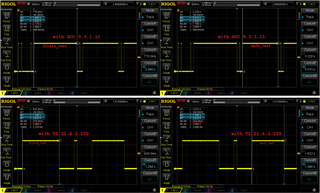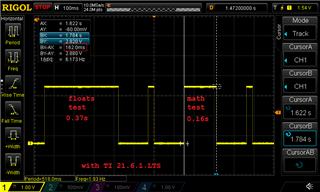Related to poor-iqmathlib-performance-with-gcc.
We tried the exact same IQmath test project with the TI compiler. Surprising result is that it’s 5.5 to 5.8 times faster! Also good news is that the IQmathLib.a links fine (doesn’t give any warnings like with GCC) and also the project works fine for bigger array test sizes (with GCC it was getting stuck at array size bigger than 247?).
But the disappointing result is the IQmath performance when compared to normal float operations: with TI-compiler is still quite similar, only 324ms vs 370ms!

Are we missing any needed configuration to improve its speed, or is it so that the IQmath lib doesn’t work well on MSP430FR6043?
Thank you,
Daniel
The test TI-project is attached (and the GCC too for reference).



